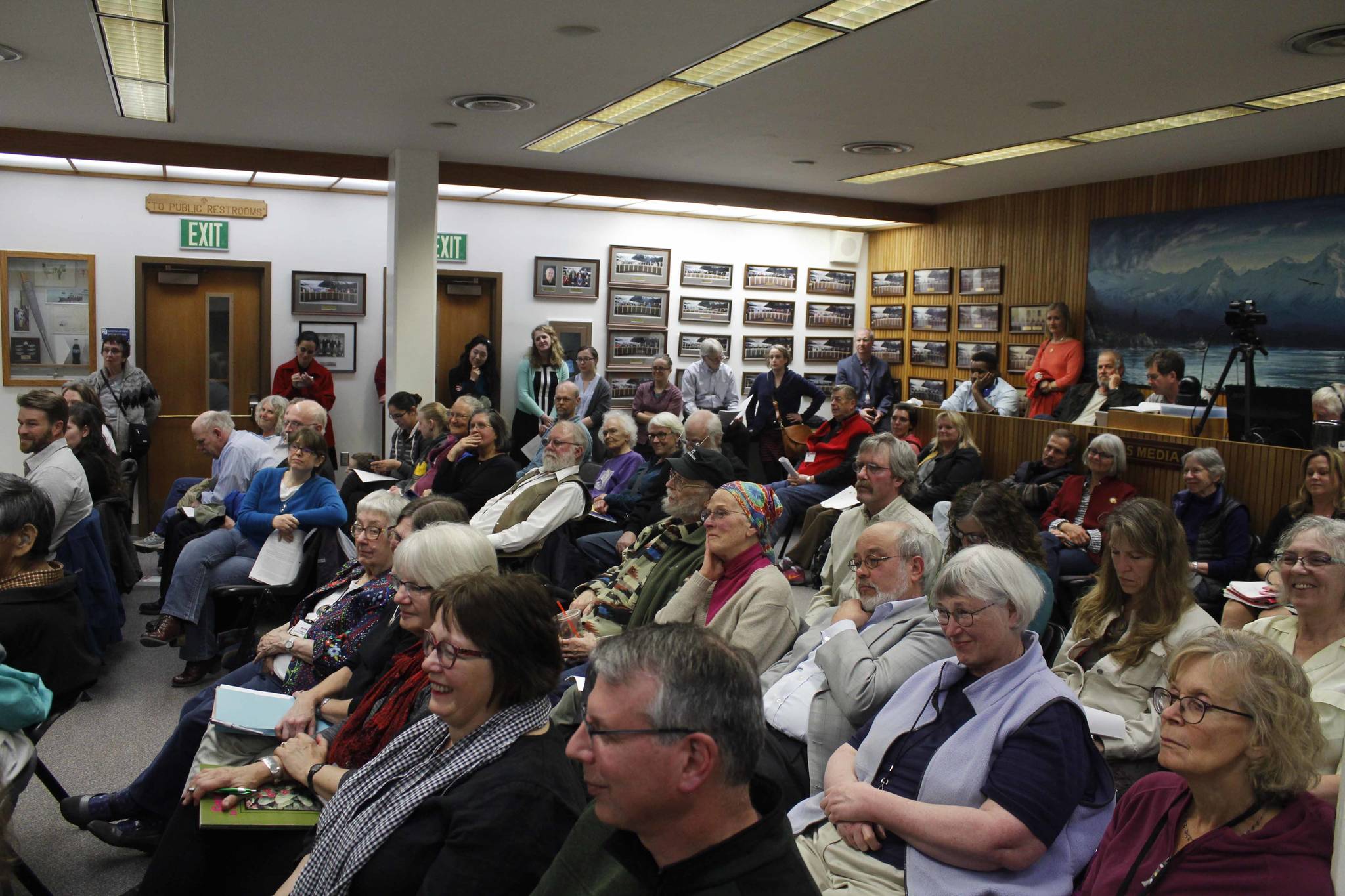The Juneau-Douglas City Museum is safe.
By an 8-1 vote at Wednesday night’s City and Borough of Juneau Assembly Finance Committee meeting, the committee voted to take the museum off the list of possible cuts in the budget for the 2018 Fiscal Year.
Prior to the Finance Committee meeting, the Assembly held a special meeting to allow members of the public to share their thoughts on the city’s budget process. The room was packed with people, occupying all 50 seats available, lining the walls and spilling out into the hallway.
Many of them were there to support the museum, and more than 15 people spent time testifying why the museum should remain. Not one person spoke against the museum, and Joel Probst, president of the Friends of the Juneau-Douglas City Museum, was surprised at the number of people who showed up.
“I thought we were gonna have a turnout,” Probst said, “I didn’t think it was going to be as compelling of a turnout as it was, honestly, so I should have had more faith in everyone in my own right, but it was incredible to see.”
In an attempt to overcome a $1.9 million shortcoming in the FY18 budget, the Finance Committee has considered many options. The City Museum, along with other services such as the Jensen-Olson Arboretum, Mount Jumbo Gym and the Eagle Valley Center, was on the list of possible services to cut in order to save money.
For the most part, those who testified gave pitches based more on emotion than hard numbers. The emotional peak of the night came when Marie Olson spoke. Olson explained that she was both in Juneau more than 90 years ago, and that when she walks into the museum, she sees her own story.
Olson kept speaking after the alarm went off signaling that her three minutes were up, and nobody stopped her. She spoke for nearly 10 minutes, telling the story of her travels around the world and the fact that when she came back home, the museum was there to tell the story of her generation and others who had grown up in Juneau.
“That told my history of this area,” Olson said. “That’s why I am here, telling the people up on the hill, don’t do that. They’re killing history that is absolutely necessary for the people here.”
At the end of her talk, Olson pleaded directly to Mayor Ken Koelsch, asking him specifically not to let the museum disappear. Koelsch was listening. Earlier that night, he had asked that all those in attendance who supported the museum stand up. Many more than half the people in the room stood.
At the end of the meetings, it was again Koelsch who spoke. Koelsch proposed that the committee take the museum off the list of possible reductions, in part because of what he saw from Olson and others who testified.
“Every person that testified had, in part, an ownership of the museum,” Koelsch said. “When a community comes out and they own their museum like this group did, it’s very compelling testimony.”
The museum ended up on the list of possible cuts due to the city’s Priority-Based Budget process. During this process, city officials asked locals to participate in a survey, ranking city-funded services around town. The City Museum was at the bottom of that list, along with the other services in question Wednesday night.
Multiple people testified at the meeting questioning this process. Among them was Mary Irvine, the supervisor of Museum Protection and Visitor Services at the Alaska State Museum.
Irvine acknowledged that it was difficult to follow Olson’s testimony, and made two distinct points. She was skeptical of the Priority-Driven Budget process, which ended up polling 90 people. Secondly, she said the new Alaska State Museum could not serve as a replacement for the City Museum.
“The Alaska State Museum explores what it means to be Alaskan,” Irvine said. “Alaska’s history. Alaska’s Native cultures. The City Museum explores what it means to be a Juneauite, a real Juneauite, whether we’re transplants, whether our people have been here for 10,000 years or more.”
This entire process comes as a bit of a wake-up call for those at the museum. Coming this close to being shut down, Probst said, shows that “the writing is on the wall” for how difficult it will be to stay open.
“Budgets are what they are and budgetary shortfalls are the reality,” Probst said, “and we’re going to have to figure out, I think pretty obviously, that we’re going to have to find additional sources of funding to keep us open and keep programs going.”
Contact reporter Alex McCarthy at alex.mccarthy@juneauempire.com or 523-2271.

